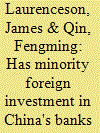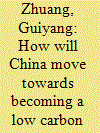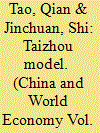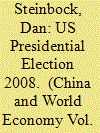|
|
|
Sort Order |
|
|
|
Items / Page
|
|
|
|
|
|
|
| Srl | Item |
| 1 |
ID:
081894


|
|
|
|
|
| Publication |
2008.
|
| Summary/Abstract |
China's sectoral trade composition, product quality mix, and the import content of processing exports have all changed substantially during the past decade. This has rendered trade elasticities estimated using aggregate data highly unstable, with more recent data pointing to significantly higher demand and price elasticities. Sectoral differences in these parameters are also very wide. All this suggests greater caution should be exercised when using historical data to simulate the response of China's economy to external shocks and exchange rate changes. Analyses based on models with estimated coefficients largely representative of China in the 1980s and 1990s are likely to turn out to be wrong, perhaps even dramatically.
|
|
|
|
|
|
|
|
|
|
|
|
|
|
|
|
| 2 |
ID:
081895


|
|
|
|
|
| Publication |
2008.
|
| Summary/Abstract |
Using simple statistical analysis of county-level budgetary data from across all of China's counties, the present paper examines whether the post-1994 fiscal decentralization has affected redistribution at the county-level. The new fiscal system has been less able to narrow inter-county dispersion in fiscal imbalances than the old one, even after taking intergovernmental transfer payments into account. Although with the post-1994 system there has been a modest increase in per capita welfare spending in all counties on average, much of the new-found fiscal resources have been spent on salary and administrative expenses rather than spending on public goods. Therefore, it is imperative that the reform of China's tax system is intensified
|
|
|
|
|
|
|
|
|
|
|
|
|
|
|
|
| 3 |
ID:
081897


|
|
|
|
|
| Publication |
2008.
|
| Summary/Abstract |
Since 2001, foreign investors have been permitted to acquire minority ownership stakes in China's banks. This paper assesses whether there is any evidence of a cost efficiency payoff in those banks that have taken on foreign investment. Data envelopment analysis is first used to generate measures of cost efficiency for China's banks over the period 2001-2006. A second stage regression is then performed to determine whether foreign investment has an impact on cost efficiency. The results indicate a positive relationship, although one that is not statistically significant. Policy implications are discussed
|
|
|
|
|
|
|
|
|
|
|
|
|
|
|
|
| 4 |
ID:
081899


|
|
|
|
|
| Publication |
2008.
|
| Summary/Abstract |
China is facing increasing pressure from the international community to curb its greenhouse emissions. The next 15-20 years are important for China's social and economic development, but this is also a key period for controlling global greenhouse gas emissions. In considering the development path of China's economy, policy-makers are confronted by the issue of global climate change. Reducing carbon emissions is now a worldwide task. For China, opportunities and challenges coexist. Post-Kyoto climate regime must provide incentives for China's transition to becoming a low carbon economy based on the principle of common but differentiated responsibilities
|
|
|
|
|
|
|
|
|
|
|
|
|
|
|
|
| 5 |
ID:
081898


|
|
|
|
|
| Publication |
2008.
|
| Summary/Abstract |
Using provincial data, the present paper examines the impact of cultivated land conversion on agriculture and the environment. It is found that the grain production center is gradually moving towards more fragile and water scarce areas, putting more pressure on the environment. Land conversion caused large losses in ecosystem service values in the 1990s, but large scale ecological restoration programs have been implemented since 2000 to compensate for such losses. The ecological restoration programs are concentrated in regions with relatively low land productivity, whereas cultivated land conversion usually takes place in areas with relatively high land productivity. Newly-cultivated land, especially that in areas marginally suit for agricultural production, is likely to have much lower productivity levels than the original cultivated land. Because the stock of potentially cultivable land is almost exhausted, China's grain self-sufficiency policy can only be maintained by preserving the available stock of arable land and increasing its productivity in a sustainable way
|
|
|
|
|
|
|
|
|
|
|
|
|
|
|
|
| 6 |
ID:
081900


|
|
|
|
|
| Publication |
2008.
|
| Summary/Abstract |
Based on the case of Taizhou City in Zhejiang Province, the present paper investigates the mechanism of the interaction between the local government and private enterprise in the process of regional economic development. We identify the "Taizhou Model" as a model of institutional innovation and the development of private economy, which is private sector-induced and local government-promoted Indeed, the impact of such mechanisms has had a significant influence on the reforms and development of China s economic system.
|
|
|
|
|
|
|
|
|
|
|
|
|
|
|
|
| 7 |
ID:
081896


|
|
|
|
|
| Publication |
2008.
|
| Summary/Abstract |
The next US president will be elected in November 2008. Since the relative stabilization of war in Iraq, the economy has become the national priority of the 2008 US election. In their campaign efforts, the Democrats have enjoyed greater momentum than the Republicans, in terms of polls, fund-raising and corporate support. After the Bush era, the next president will seek to restore America's leadership and to engage in multilateralism. Since the 1990s, China has been the most rapidly-growing US export destination. In terms of US-Chinese trade and investment, the next president, if a Democrat, will, among other issues, review trade agreements and has pledged to co-sponsor legislation that would allow US companies to seek anti-dumping duties on Chinese imports based on the perceived undervaluation of the Chinese currency. If a Republican, the next president will support global integration and oppose protectionist measures. The Democratic Congress is likely to oppose Republican policies in general and free trade policies in particular. Both scenarios imply increasing pressure on US-Chinese trade and investment relationships. Because these two nations now account for almost half of global growth, the state of the futureUS-Chinese bilateral relationship has worldwide implications
|
|
|
|
|
|
|
|
|
|
|
|
|
|
|
|
|
|
|
|
|